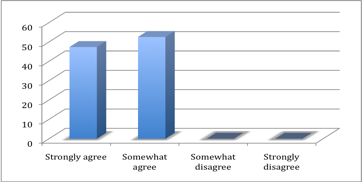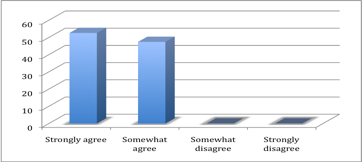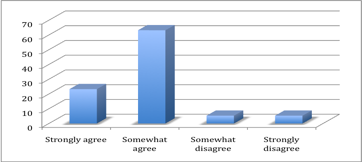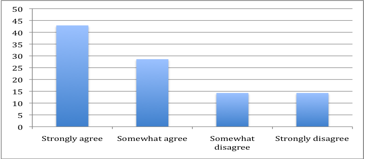EDC-638C Participatory Action
Research
REVIEW OF ACTION RESEARCH PROJECT
The problem that I have identified is the need to improve students’ ability to have a deeper understanding of concepts taught in Periodontology courses, and then demonstrate the ability to implement these concepts during patient care. And, therefore the purpose of my action research is to learn how to increase students’ learning with a deeper understanding of the concepts being taught in the didactic courses on Periodontology. The broad research question for this action research project is “can the incorporation of collaborative learning strategies improve students’ learning with deeper understanding?”
The initial question addressed in cycle one was “if students utilize a wiki to build, discuss and reflect on periodontal concepts presented in DEH-33 Periodontology will it result in a deeper understanding of the concepts addressed during this class?” This question required the assessment of the perceptions of the dental hygiene students and the clinical faculty on the students’ demonstration of periodontal knowledge and understanding during patient care. Cycle one included the use of the wiki and the redesign of DEH-43 Periodontology curriculum using the Understanding by Design model.
The outcomes from cycle included the students’ acknowledgement that the use of the wiki was helpful for them to expand their knowledge and they enjoyed using it. The use of the wiki to develop a site with evidence-based information on periodontal concepts and to develop cases allowed students to work collaboratively together but was only the first step of this process. Its limitations could be a design flaws or inherent limitations in the use of wikis. Therefore, I’ve decided to add an additional collaborative tool to cycle two to complement the use of the wiki.
TRANSITION FROM CYCLE ONE TO CYCLE TWO
Prior to the
implementation of cycle two, I held three clinical faculty calibration sessions
to discuss the expectation of the level of knowledge students should be able to
demonstrate in clinic and to come to agreement on these expectations. All clinical faculty participated and
it appeared that all appreciated the opportunity to openly discuss concerns and
student expectations. At the
conclusion of the last calibration session, it was agreed that clinical faculty
members would participate in weekly discussions on Google groups to continue an
open discussion on the expectations of students’ level of understanding.
INTRODUCTION TO CYCLE TWO
My goal and direction of
my action research project has been consistent since its inception but what has
changed is an understanding of the forces that affects the success of students.
I did some further research to determine what other collaborative tools had
been used with success in professional programs. I found that the discussion boards have been used
successfully with both faculty and peer facilitators. Further research found that many dental schools have
incorporated peer led learning groups due to the lack of faculty and have had
some success with this process. I
have used peer educators in the past but the outcome was unpredictable. Now that I have a clearer understanding
of the impact of the course design on students learning and after having a
lengthy conversation with a dental student who expressed the sense of
empowerment he felt with this exercise, I have chosen revisit the peer led
learning activities.
ACTION OUTCOMES AND RESULTS
Utilization of the Wiki Site
The use of the wiki started from the first day that URL (http://deh43.wikispaces.com/) was distributed and has had a constant flow of students on it daily. Students have been using this site more consistently than in cycle one. This wiki site is for their use and is not a graded assignment. I feel this was a way for students to have an informal learning experience and it follows Paul Ramsden’s belief that “learning is interpreting and understanding reality in a different way. Learning involves comprehending the world by interpreting knowledge.” If was my belief that having the students do literature searches to find the latest research information and then sharing and interpreting it in a collaborative environment would strengthen their learning and understanding of the periodontal concepts.
In cycle one there was minimal traffic on the wiki and use by students between week two and week fourteen (two weeks prior to the end of the semester). In cycle two there has been 100% involvement by the students that is an improvement over cycle one. This may be due to the students’ familiarity with using a wiki and the use of this site to prepare for the National Board Exam that took place on March 24, 2009. The students deepening understanding of concepts are evident on the wiki. An example is when a paragraph was written on the wiki with inaccurate information from a non-peer reviewed source and two students question the information. After this, four students found research that contradicted the original information and ultimately the original paragraph was rewritten to reflect current and accurate information. They then went on to explain why the original information was incorrect and the consequences in patient care for using this information.
The average student visit to the wiki is 49 visits a week with a range of 110 to 1. The one visit being the week of the National Board Exam where the students had no periodontal assignments. And, all students have been one the site each week.

Question #2: Has the use
of the discussion board to discuss periodontal topics in DEH-43 allowed you to
deepen your understanding of the specific periodontal topics?

My
observation of having a peer moderator for each weekly discussion seemed to
allow students to be more open with the knowledge they didn’t have. This allowed for the students to work
towards providing clinical examples and/or references for the student to use to
learn the knowledge that was lacking.
The students were questioned about the perceived benefits of using a
peer moderator for the discussion.

The majority of the students’ felt that having peer led discussions somewhat enhanced their acquisition of knowledge. One student justified her response by stating, “Working together helps brainstorming come together more. I may think of something and point something out that someone else did not think of and vise versa and I learn a lot from this.” Two other comments regarding the need for faculty presents “Peers do amazing, but does need instructor guidance in some cases” and “I learn better when instructors on are discussion boards facilitating the discussion asking questions.”

REFLECTIONS
Cycle two lasted for only four
weeks, which was half the time of cycle one, so it seemed to be over
immediately. My action research
project is part of a course so the steps that have been initiated for cycle two
will remain in place until the end of the semester. This will enhance my
interpretation of the impact of cycle two.
I find it’s easy to get caught
up in students’ enthusiasm for the use of the wiki. I continue to remind myself of what Dewey stated about the importance of finding an experience that will match the
desired outcomes. "Hence the central problem of an education based upon
experience is to select the kind of present experiences that live fruitfully
and creatively in subsequent experiences" (Dewey). I do believe the wiki is enhancing the
transmission of knowledge to a deeper understanding but I don’t feel it can
accomplish this independently.
My reflections on the outcomes of
cycle two include the difficulties that I’m having separating my desire to find
a solution to the initial problem of the action research project and whether
what the actions I’ve implemented are directly affecting the desired
outcome. I believe I’ve assumed
too much ownership in the success of this project during the process of cycle
two.
Additionally, during this cycle,
I changed my focus somewhat from the designer to an observer of two groups:
students and clinical faculty members.
I was trying to determine if the identified problem with faculty’s
expectations had been resolved, at least to some degree. It is evident that this is a continual
issue. I believe that this problem
is a topic for a parallel action research project and will require many
different cycles to bring the faculty together in philosophy and expectations
of students. Until this happens, I believe the assessment of my current action
research project will always be somewhat skewed.
The reflections on my actions during cycle two are mixed. I feel my frustration with the clinical faculty was evident and it resulted in a less than open communication. I believe this also connected with my weakness in listening to others as they are expressing their opinions. I need to learn to my role of administrator and return to the role of a peer to be embraced by the clinical faculty. I’ve also found the opposite to be true with students. I can listen and be engaged with them for hours. This identifies a very important change in behavior that I need to incorporate for the success of this action research project and to strength my leadership abilities.